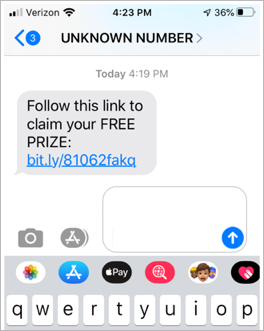
You know to be wary of phishing emails and phone scams, but did you know that crooks also send text messages to steal your identity and money?
These scams, called “smishing”—the word comes from SMS + phishing—appear to be increasing during the COVID-19 pandemic.
Warning signs
Consider any unexpected text message from an unknown number suspect. Smishes may prompt you to click a link or reply—usually by offering you something or provoking your curiosity or fear. Here are some common smishes:
- You are told you have been in contact with someone who’s tested positive for the coronavirus and asked to click to schedule a test. This is a scam designed to steal your personal information.
- You are offered a free coronavirus test kit—from an unknown number with no details. The scammers usually ask for your credit card number to cover shipping for a test kit that will never arrive.
- You are told your package has arrived—but you didn’t order one. The fake tracking link will take you to a site asking for your credit card number to cover shipping costs for a package you will never receive.
For more examples, see Safe Computing: Text Message (SMS) Scams—Smishing.
If you get a smish
- Do not reply. That alerts the sender that the number is active.
- Do not open links from unknown numbers or unsolicited, unexpected texts.
- Check with the sender if you aren’t sure and think the message may be legitimate. Use a verified phone number or email address to contact them.
